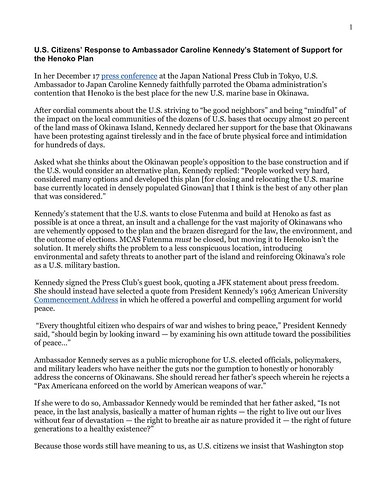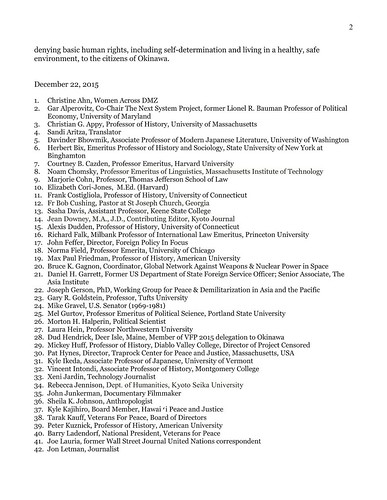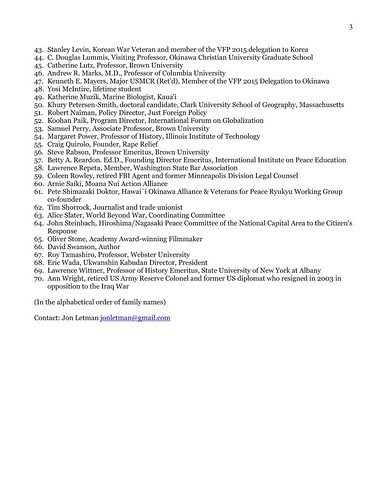(12月17日の記者会見より、キャロライン・ケネディ駐日米国大使 via U.S. Embassy Tokyo)
キャロライン・ケネディ駐日米国大使が12月17日の日本記者クラブでの記者会見で、辺野古における新米軍基地建設が最善だと発言。この普天間飛行場の移設を支持する発言に対し22日、映画監督のオリバー・ストーン、言語学者のノーム・チョムスキー、ドキュメンタリー映画監督のジャン・ユンカーマン、アメリカン大学教授で『オリバー・ストーンが語る もうひとつのアメリカ史』の共著者であるピーター・カズニックら70人のアメリカ人が抗議声明を発表した。
今回の抗議声明にはそのほか、沖縄返還に関する米政府の交渉担当者のモートン・ハルペリンや元米陸軍大佐で外交官のアン・ライト、元連邦上院議員で大統領選にも立候補したことがあるマイク・グラベルが加わっている。
webDICEでは、この声明全文を日本語訳とともにサイトで掲載したピース・フィロソフィー・センターの許可を得て転載する。
今回の声明については、共同通信、時事通信、東京新聞、沖縄タイムスなどが報道し、琉球新報は声明日本語訳全文と署名者リストを掲載した。
キャロライン・ケネディ大使の辺野古新基地支持発言に対するアメリカ市民のレスポンス
12月17日、日本記者クラブ(東京)における記者会見で、キャロライン・ケネディ駐日米国大使は、辺野古が沖縄における米国海兵隊の新基地の場所として最善であるとのオバマ政権の主張を忠実に繰り返した。
米国が「よき隣人」であろうと努力しており、また[沖縄本島の約20%を占める何十もの米軍基地の]地域社会への影響については「気を配る」という丁寧なコメントをしたあと、ケネディ大使は、沖縄の人々が容赦ない実力行使と威嚇にもかかわらず何百日も抗議活動をしている基地に対しての支持を表明した。
[訳者註:記者会見で]基地建設に対する沖縄の人々の反対についてどう思うか、また、米国は代替案を検討するだろうかとの問いに対しケネディ大使は「この計画[現在人口の密集する宜野湾に位置する米海兵隊基地を閉鎖し移設するための]は人々が大変懸命に努力し、多くの選択肢を検討し、練り上げてきたものだ。だから私は今まで検討された計画でこれが最善のものと思っている」と答えた。
米国が普天間基地を閉鎖し辺野古に基地建設を一刻も早くすることを欲しているというケネディ大使の発言は、この計画に激しく反対してきた沖縄の圧倒的多数の人々に対する脅威、侮辱、挑戦であり、同時に法律、環境、選挙結果を恥ずかしげもなく軽視する行為である。普天間基地は閉鎖されなければならないが、辺野古に移設することは解決策とはならない。この計画はより人目のつかない場所に問題を移動するだけであり、島の別の場所に新たな環境・安全面の脅威を導入し、沖縄の米軍拠点としての役割を強化するものだ。
ケネディ大使は、日本記者クラブのゲストブックに、ジョン・F・ケネディ元大統領による報道の自由についての発言を引用しながら署名した。しかし大使が引用するべきはむしろ、ケネディ元大統領が世界平和について強力で説得力のある主張を行った、1963年のアメリカン大学における卒業式スピーチだったのではないか。
ケネディ元大統領は言った。「戦争に絶望し、平和をもたらすことを望む思慮深い市民は誰でも、まず内面を見ることから始めるべきだ―平和の可能性への自らの態度を調べることを……」
ケネディ大使は、沖縄の人々の懸念に対し、誠実に尊厳をもって取り組む勇気も度胸も持たないような、米国の選挙で選ばれた公職者、政策立案者、軍の指導者たちの代弁者としての役割を果たしている。大使は父親が「アメリカの軍事力によって世界に強制的にもたらされるパクス・アメリカーナ」を拒絶したスピーチをもう一度読むべきだ。
もし再読したならばケネディ大使は父親が「つまり平和とは、基本的に、荒廃の恐怖を感じることなく生活できる権利、自然の空気をそのまま呼吸する権利、将来の世代まで健全に存続する権利といった、人権に関する問題ではないか」と問うたことを思い起こすことだろう。
これらの言葉は我々にとってまだ意味があるがゆえに、我々は米国市民として、米国政府が、自己決定権、健全で安全な環境で暮らす権利を含む、沖縄の市民の基本的人権を否定することを止めるよう強く要求する。
2015年12月22日
1. クリスティーン・アン、「DMZをわたる女性たち」
2. ガー・アルペロビッツ、「ネクスト・システム・プロジェクト」共同代表、メリーランド大学政治経済学元教授
3. クリスチャン・G・アッピー、マサチューセッツ工科大学歴史学教授
4. サンディ・アリッツァ、翻訳家
5. ダビンダー・ボウミック、ワシントン大学近代日本文学准教授
6. ハーバート・ビックス、ニューヨーク州立大学ビンガムトン校歴史学・社会学名誉教授
7. コートニー・B・キャズデン、ハーバード大学名誉教授
8. ノーム・チョムスキー、マサチューセッツ工科大学言語学名誉教授
9. マージョリー・コーン、トーマス・ジェファーソン法科大学院教授
10. エリザベス・コリ―ジョーンズ、教育学修士(ハーバード大学)
11. フランク・コスティグリオラ、コネチカット大学歴史学教授
12. ボブ・クッシング、セント・ジョセフ教会(ジョージア州)神父
13. サーシャ・デイビス、キーン州立大学助教授
14. ジーン・ダウニー、M.A., J.D.,『京都ジャーナル』寄稿編集者
15. アレクシス・ダデン、コネチカット大学歴史学教授
16. リチャード・フォーク、プリンストン大学国際法名誉教授
17. ジョン・フェッファー、『フォーリン・ポリシー・イン・フォーカス』ディレクター
18. ノーマ・フィールド、シカゴ大学名誉教授
19. マックス・ポール・フリードマン、アメリカン大学歴史学教授
20. ブルース・ギャグノン、「宇宙への兵器と核エネルギーの配備に反対する地球ネット」コーディネーター
21. ダニエル・H・ギャレット、元国務省外交局職員、アジア・インスティテュート研究員
22. ジョセフ・ガーソン(PhD)、アジア太平洋平和と非軍事化ワーキンググループ
23. ゲリー・ゴールドスタイン、タフツ大学教授
24. マイク・グラベル、元米国上院議員(1969-1981)
25. メル・ガートフ、ポートランド州立大学政治学名誉教授
26. モートン・ハルペリン、政治学者
27. ローラ・ハイン、ノースウェスタン大学教授
28. ダッド・ヘンドリック、(メイン州デア・アイル)2015年「平和のための退役軍人会」沖縄派遣団メンバー
29. ミッキー・ハフ、ディアブロ・バリー・カレッジ歴史学教授、「プロジェクト・センサード」ディレクター
30. パット・ハインズ、「トラップロック・センター・フォー・ピース・アンド・ジャスティス」(マサチューセッツ州)ディレクター
31. カイル・イケダ、バーモント大学日本語准教授
32. ビンセント・イントンディ、モンゴメリー・カレッジ歴史学准教授
33. ゼニ・ジャーディン、テクノロジー・ジャーナリスト
34. レベッカ・ジェニソン、京都精華大学人文学部
35. ジャン・ユンカーマン、ドキュメンタリー映画監督
36. シーラ・K・ジョンソン、人類学者
37. カイル・カジヒロ、「ハワイ・ピース・アンド・ジャスティス」理事
38. タラック・カウフ、「平和のための退役軍人会」理事
39. ピーター・カズニック、アメリカン大学歴史学教授
40. バリー・レイデンドーフ、「平和のための退役軍人会」全国会長
41. ジョー・ローリア、元『ウォール・ストリート・ジャーナル』国連担当記者
42. ジョン・レットマン、ジャーナリスト
43. スタンリー・レビン、朝鮮戦争退役軍人、「平和のための退役軍人会」2015年韓国派遣団メンバー
44. C・ダグラス・ラミス、沖縄キリスト教大学大学院客員教授
45. キャサリン・ルッツ、ブラウン大学教授
46. アンドリュー・R・マークス、M.D.、コロンビア大学教授
47. ケネス・E・メイヤーズ、米海兵隊予備役(退役)、「平和のための退役軍人会」2015年沖縄派遣団メンバー
48. ヨシ・マッキンタイア、生涯の学生
49. キャサリン・ミュージック、海洋生物学者(ハワイ州カウアイ島)
50. クリー・ピーターソン―スミス、クラーク大学(マサチューセッツ)地理学部博士課程在籍
51. ロバート・ナイマン、「ジャスト・フォーリン・ポリシー」政策ディレクター
52. クーハン・パク、「グローバライゼーションを考える国際フォーラム」プログラム・ディレクター
53. サミュエル・ペリー、ブラウン大学准教授
54. マーガレット・パワー、イリノイ工科大学歴史学教授
55. クレイグ・キロロ、「レイプ・リリーフ」創立者
56. スティーブ・ラブソン、ブラウン大学名誉教授
57. ベティ・A・レアドン、Ed.D.,「平和教育に関する国際研究所」創立者
58. ローレンス・レペタ、ワシントン州弁護士会メンバー
59. コリーン・ラウリー、元FBI捜査官およびミネアポリス支部顧問弁護士
60. アーニ・サイキ、「モアナ・ヌイ・アクション・アライアンス」
61. ピート・シマザキ・ドクター、「ハワイ・沖縄アライアンス」、「平和のための退役軍人会」琉球ワーキンググループ共同創立者
62. ティム・ショロック、ジャーナリストおよび労働運動家
63. アリス・スレーター、「ワールド・ビヨンド・ウォー」調整委員会
64. ジョン・スタインバック、「首都エリアヒロシマ・ナガサキ平和コミティー」
65. オリバー・ストーン、アカデミー賞受賞映画監督
66. デイビッド・スワンソン、著述業
67. ロイ・タマシロ、ウェブスター大学教授
68. エリック・ワダ、御冠船歌舞団ディレクター、会長
69. ローレンス・ウィットナー、ニューヨーク州立大学アルバニー校歴史学名誉教授
70. アン・ライト、退役米国陸軍大佐、元外交官(2003年イラク戦争に反対して辞職)
(姓のアルファベット順)
※この「レスポンス」発表後に届いた署名を以下、賛同順に追記。
マイケル・ミンチ、ユタ・バリー大学歴史学教授
ボーライアン・キヨシ・ケネディ、経理職
ジョン・デッカー、ISHECI会長
ノリコ・オーヤマ、ISHECIディレクター
(日本語訳:ピース・フィロソフィー・センター)
U.S. Citizens’ Response to Ambassador Caroline Kennedy’s Statement of Support for the Henoko Plan
In her December 17 press conference at the Japan National Press Club in Tokyo, U.S. Ambassador to Japan Caroline Kennedy faithfully parroted the Obama administration’s contention that Henoko is the best place for the new U.S. marine base in Okinawa.
After cordial comments about the U.S. striving to “be good neighbors” and being “mindful” of the impact on the local communities of the dozens of U.S. bases that occupy almost 20 percent of the land mass of Okinawa Island, Kennedy declared her support for the base that Okinawans have been protesting against tirelessly and in the face of brute physical force and intimidation for hundreds of days.
Asked what she thinks about the Okinawan people’s opposition to the base construction and if the U.S. would consider an alternative plan, Kennedy replied: “People worked very hard, considered many options and developed this plan [for closing and relocating the U.S. marine base currently located in densely populated Ginowan] that I think is the best of any other plan that was considered.”
Kennedy’s statement that the U.S. wants to close Futenma and build at Henoko as fast as possible is at once a threat, an insult and a challenge for the vast majority of Okinawans who are vehemently opposed to the plan and the brazen disregard for the law, the environment, and the outcome of elections. MCAS Futenma must be closed, but moving it to Henoko isn’t the solution. It merely shifts the problem to a less conspicuous location, introducing environmental and safety threats to another part of the island and reinforcing Okinawa’s role as a U.S. military bastion.
Kennedy signed the Press Club’s guest book, quoting a JFK statement about press freedom. She should instead have selected a quote from President Kennedy's 1963 American University Commencement Address in which he offered a powerful and compelling argument for world peace.
“Every thoughtful citizen who despairs of war and wishes to bring peace,” President Kennedy said, “should begin by looking inward ? by examining his own attitude toward the possibilities of peace…”
Ambassador Kennedy serves as a public microphone for U.S. elected officials, policymakers, and military leaders who have neither the guts nor the gumption to honestly or honorably address the concerns of Okinawans. She should reread her father’s speech wherein he rejects a “Pax Americana enforced on the world by American weapons of war.”
If she were to do so, Ambassador Kennedy would be reminded that her father asked, “Is not peace, in the last analysis, basically a matter of human rights ? the right to live out our lives without fear of devastation ? the right to breathe air as nature provided it ? the right of future generations to a healthy existence?”
Because those words still have meaning to us, as U.S. citizens we insist that Washington stop denying basic human rights, including self-determination and living in a healthy, safe environment, to the citizens of Okinawa.
December 22, 2015
1. Christine Ahn, Women Across DMZ
2. Gar Alperovitz, Co-Chair The Next System Project, former Lionel R. Bauman Professor of Political Economy, University of Maryland
3. Christian G. Appy, Professor of History, University of Massachusetts
4. Sandi Aritza, Translator
5. Davinder Bhowmik, Associate Professor of Modern Japanese Literature, University of Washington
6. Herbert Bix, Emeritus Professor of History and Sociology, State University of New York at Binghamton
7. Courtney B. Cazden, Professor Emeritus, Harvard University
8. Noam Chomsky, Professor Emeritus of Linguistics, Massachusetts Institute of Technology
9. Marjorie Cohn, Professor, Thomas Jefferson School of Law
10. Elizabeth Cori-Jones, M.Ed. (Harvard)
11. Frank Costigliola, Professor of History, University of Connecticut
12. Fr Bob Cushing, Pastor at St Joseph Church, Georgia
13. Sasha Davis, Assistant Professor, Keene State College
14. Jean Downey, M.A., J.D., Contributing Editor, Kyoto Journal
15. Alexis Dudden, Professor of History, University of Connecticut
16. Richard Falk, Milbank Professor of International Law Emeritus, Princeton University
17. John Feffer, Director, Foreign Policy In Focus
18. Norma Field, Professor Emerita, University of Chicago
19. Max Paul Friedman, Professor of History, American University
20. Bruce K. Gagnon, Coordinator, Global Network Against Weapons & Nuclear Power in Space
21. Daniel H. Garrett, Former US Department of State Foreign Service Officer; Senior Associate, The Asia Institute
22. Joseph Gerson, PhD, Working Group for Peace & Demilitarization in Asia and the Pacific
23. Gary R. Goldstein, Professor, Tufts University
24. Mike Gravel, U.S. Senator (1969-1981)
25. Mel Gurtov, Professor Emeritus of Political Science, Portland State University
26. Morton H. Halperin, Political Scientist
27. Laura Hein, Professor Northwestern University
28. Dud Hendrick, Deer Isle, Maine, Member of VFP 2015 delegation to Okinawa
29. Mickey Huff, Professor of History, Diablo Valley College, Director of Project Censored
30. Pat Hynes, Director, Traprock Center for Peace and Justice, Massachusetts, USA
31. Kyle Ikeda, Associate Professor of Japanese, University of Vermont
32. Vincent Intondi, Associate Professor of History, Montgomery College
33. Xeni Jardin, Technology Journalist
34. Rebecca Jennison, Dept. of Humanities, Kyoto Seika University
35. John Junkerman, Documentary Filmmaker
36. Sheila K. Johnson, Anthropologist
37. Kyle Kajihiro, Board Member, Hawai?i Peace and Justice
38. Tarak Kauff, Veterans For Peace, Board of Directors
39. Peter Kuznick, Professor of History, American University
40. Barry Ladendorf, National President, Veterans for Peace
41. Joe Lauria, former Wall Street Journal United Nations correspondent
42. Jon Letman, Journalist
43. Stanley Levin, Korean War Veteran and member of the VFP 2015 delegation to Korea
44. C. Douglas Lummis, Visiting Professor, Okinawa Christian University Graduate School
45. Catherine Lutz, Professor, Brown University
46. Andrew R. Marks, M.D., Professor of Columbia University
47. Kenneth E. Mayers, Major USMCR (Ret’d), Member of the VFP 2015 Delegation to Okinawa
48. Yosi McIntire, lifetime student
49. Katherine Muzik, Marine Biologist, Kaua'i
50. Khury Petersen-Smith, doctoral candidate, Clark University School of Geography, Massachusetts
51. Robert Naiman, Policy Director, Just Foreign Policy
52. Koohan Paik, Program Director, International Forum on Globalization
53. Samuel Perry, Associate Professor, Brown University
54. Margaret Power, Professor of History, Illinois Institute of Technology
55. Craig Quirolo, Founder, Rape Relief
56. Steve Rabson, Professor Emeritus, Brown University
57. Betty A. Reardon. Ed.D., Founding Director Emeritus, International Institute on Peace Education
58. Lawrence Repeta, Member, Washington State Bar Association
59. Coleen Rowley, retired FBI Agent and former Minneapolis Division Legal Counsel
60. Arnie Saiki, Moana Nui Action Alliance
61. Pete Shimazaki Doktor, Hawai`i Okinawa Alliance & Veterans for Peace Ryukyu Working Group co-founder
62. Tim Shorrock, Journalist and trade unionist
63. Alice Slater, World Beyond War, Coordinating Committee
64. John Steinbach, Hiroshima/Nagasaki Peace Committee of the National Capital Area to the Citizen's Response
65. Oliver Stone, Academy Award-winning Filmmaker
66. David Swanson, Author
67. Roy Tamashiro, Professor, Webster University
68. Eric Wada, Ukwanshin Kabudan Director, President
69. Lawrence Wittner, Professor of History Emeritus, State University of New York at Albany
70. Ann Wright, retired US Army Reserve Colonel and former US diplomat who resigned in 2003 in opposition to the Iraq War(In the alphabetical order of family names)
Below are signatures that arrived after the release of the statement.
Michael Minch, Professor of History, Utah Valley University
BeauRyan Kiyoshi Kennedy, Account Manager
John Decker, President, ISHECI
Noriko Oyama, Director, ISHECI
【ピース・フィロソフィー・センター】
U.S. Citizens' Response to Ambassador Caroline Kennedy's Statement of Support for the Henoko Plan キャロライン・ケネディ大使の辺野古新基地支持発言に対するアメリカ市民のレスポンス(2015/12/23)
http://peacephilosophy.blogspot.jp/2015/12/us-citizens-response-to-ambassador.html
【琉球新報】
辺野古最善は「侮辱」 米識者70人、ケネディ氏発言に抗議声明(2015/12/24)
http://ryukyushimpo.jp/news/entry-193589.html
【関連記事】
「日本はアメリカの衛星国家としてカモにされている、なぜ立ち上がろうとしない?」 来日したオリバー・ストーン監督による広島・原水爆禁止世界大会でのスピーチ全文(2013/8/12)
http://www.webdice.jp/dice/detail/3946/



